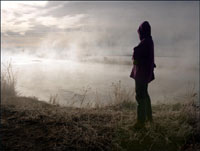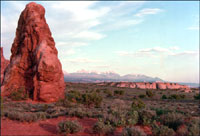We were exploring an unfamiliar pond. My four-year-old daughter was out in the water, up to her knees, when I called her back to shore: “It’s so muddy I can’t see if the pond gets deep quickly,” I said. “And I couldn’t reach you if you fell in. Better safe than sorry.”
Parents try to give their kids room to make their own mistakes, but when there is any reason to think their safety might be at stake, most of us draw the line.
As the Kyoto treaty on climate change moves forward without the participation of the U.S., I have been wondering about the difference between the logic of a parent and the logic of a president. In March, President Bush cited “the incomplete state of scientific knowledge of the causes of, and solutions to, global climate change” as a reason for his opposition to the treaty.

What dangers lurk beneath the surface?
Photo: NREL/PIX.
I have the opposite reaction. Like the murky water in the pond, the uncertainty about global warming makes me want to shout, “Stop!” Stop going forward if you do not know toward what you are walking.
A report from the U.N. Intergovernmental Panel on Climate Change lists the level of understanding of 12 factors that affect the temperature of the Earth. Only one factor (carbon dioxide) is rated as highly understood. The level of understanding for eight others is “very low.” Climate scientists cannot predict the exact temperature 100 years from now. They cannot predict the precise consequences of an increase in average temperature.
Despite this incomplete understanding, the current scientific consensus is that the Earth’s temperature is rising as a result of increasing emissions of greenhouse gases, and that temperature changes will have impacts that might include decreases in polar ice, higher sea levels, and shifts in the ranges of plants and animals.
The White House sent a list of questions to the U.S. National Academy of Sciences, including this one: “Has science determined whether there is a ‘safe’ level of concentration of greenhouse gases?” The scientists could not answer the question, because, “it would require a value judgment of what constitutes an acceptable risk to human welfare and ecosystems in various parts of the world.”
Well, I am willing to go further than the scientists, and I bet a lot of other people are, too. Risking that just the right amount of rain might not fall in just the right places is not acceptable. Risking that the permafrost might melt is not acceptable. Risking that islands full of people and wildlife might be swallowed by the ocean is not acceptable.
Say you are willing to make a value judgment — then what? I think that together we need to add one more chapter to the climate reports: the value chapter. We must say that all children are priceless, and they need a stable climate in order to have good lives. We need to say this even if we feel silly, or sentimental, or soft for trying to bring what we love into the public discourse.

How long before this desert bites the dust?
Photo: NREL/PIX.
Do you love the southwestern desert? Global warming scenarios suggest it could change to grassland. What do you love about it? The colors? The smells? How it makes you feel? Write a poem or a song or a letter to the editor. Just tell of the value of a desert.
Does your daughter want to be a farmer? Speak of your hopes that she will have dependable weather, so that her only obstacle will be her own willingness to work and learn.
Do you love to ski? With a warming Earth, winters could be warmer, with less skiing and more hiking. If this matters to you, look inside to see why, and then tell others. Is it the sound of the blue jays in snow-covered hemlocks? The fact that all the life of the forest is adapted to the expectation of snow? Just speak of the value of winter.
The idea, “better safe than sorry,” makes sense only when something is understood to be precious and vulnerable. And preciousness can be communicated only when people are willing to speak from the heart about what matters most to them.
The reports of the NAS and the IPCC spell out some scenarios for a warmer Earth. The scenarios make it clear that, from polar bears to coral reefs to the prairie wetlands, there are many things at stake. For each place, plant, or animal in danger, there are people who can speak about its preciousness, even its sacredness. There are people who can lay the kind of foundation that is needed to allow a president to say, “Better safe than sorry.”

